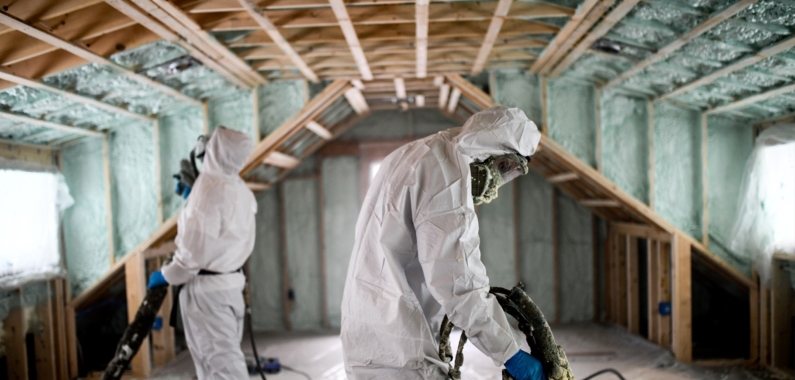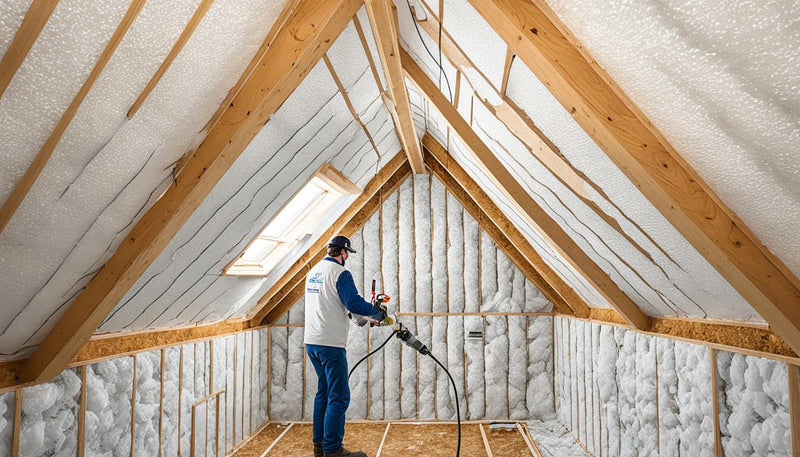Spray Foam: The Ultimate Service for Air Sealing and Insulation
Spray foam insulation has actually emerged as a leading solution for effective air sealing and thermal insulation, providing an unique combination of residential or commercial properties that establish it apart from traditional methods. Understanding the full range of its benefits, installment procedures, and contrasts with other insulation types is vital for making educated decisions.
What Is Spray Foam?
Spray foam is a versatile insulation material that incorporates the principles of air securing and thermal resistance to improve energy performance in structures. Made up largely of polyurethane or other comparable substances, spray foam is applied as a liquid that broadens upon contact with surface areas, creating a solid, continuous layer of insulation. This special home enables it to load voids, splits, and gaps that traditional insulation materials might overlook, giving a premium air seal.
There are two primary sorts of spray foam: open-cell and closed-cell. Open-cell spray foam is lighter and more adaptable, providing superb sound absorption and a reduced R-value per inch - Spray Foam. On the other hand, closed-cell spray foam is denser, offering a greater R-value, dampness resistance, and added architectural integrity to building parts
The application procedure typically involves specialized equipment, making sure a seamless application that sticks to various substratums, including metal, concrete, and wood. This flexibility makes spray foam appropriate for both brand-new buildings and retrofitting existing structures. Its ability to develop an airtight obstacle significantly adds to decreasing energy usage and boosting indoor air top quality, therefore making it a favored choice amongst house owners and builders alike.
Benefits of Spray Foam Insulation
Among one of the most significant advantages of spray foam insulation is its phenomenal capability to produce a continual air barrier, which successfully decreases power loss. Unlike conventional insulation products, spray foam broadens to load cracks and spaces, making sure that air leakage is considerably decreased. This particular not just enhances power effectiveness but likewise causes lower energy expenses with time.
Furthermore, spray foam insulation provides superior thermal resistance, adding to an extra stable indoor atmosphere. Its high R-value per inch enables for reliable insulation in constrained areas, making it suitable for attics, walls, and crawl rooms. The moisture-resistant residential properties of spray foam help prevent mold and mildew and mold growth, promoting much healthier living problems.
One more important benefit of spray foam insulation is its sound-dampening top qualities (Spray Foam). It successfully decreases noise transmission in between rooms, producing a quieter and a lot more comfortable home environment. The longevity of spray foam additionally stands apart, as it does not droop or clear up in time, maintaining its efficiency throughout its life-span
How Spray Foam Works
Understanding just how spray foam insulation works is crucial for appreciating its effectiveness in air securing and thermal resistance. Spray foam insulation includes 2 main components: isocyanate and polyol resin. When these parts are combined, they undertake a chain reaction that triggers the product to broaden quickly, producing a thick foam that fills fractures, tooth cavities, and gaps.
As the foam broadens, it abides by surfaces, developing an airtight seal that dramatically reduces air seepage. This particular makes spray foam insulation highly effective at preventing drafts and moisture penetration, which can lead to energy loss and damage over time. Additionally, the closed-cell variant of spray foam uses superior thermal resistance due to its inflexible framework, successfully minimizing warm transfer.
The one-of-a-kind residential or commercial properties of spray foam enable it to comply with irregular surfaces, making sure extensive protection and a smooth barrier. Because of this, spray foam insulation not only improves energy efficiency yet also adds to boosted indoor air top quality by reducing the accumulation of irritants and toxins. Inevitably, recognizing the technicians behind spray foam emphasizes its role as a superior option for insulation and air sealing in both industrial and property applications.
Setup Process Review

Before setup, the room needs to be appropriately cleansed and prepped, ensuring that surface areas are without particles, dust, and dampness. This step is critical because impurities can jeopardize bond and total performance. When the location is prepared, the application entails mixing both components of the spray foam, which expands upon call and fills up voids successfully.
Trained specialists must conduct the installment, utilizing specific tools to make certain uniform protection and optimum density. Security preventative measures, consisting of putting on protective gear and guaranteeing proper air flow, are critical throughout this process. After application, the foam generally remedies swiftly, creating a solid barrier that boosts power efficiency.
Contrasting Spray Foam to Standard Insulation
When evaluating insulation alternatives, spray foam insulation stands apart in comparison to conventional products such as fiberglass and cellulose. Among the main advantages of spray foam is its premium air securing capabilities. Unlike fiberglass and cellulose, which can enable air seepage, internet spray foam increases upon application, filling spaces and holes to develop a closed seal. This causes enhanced energy effectiveness, as less heated or cooled air leaves the home, leading to reduced energy costs.
Furthermore, spray foam offers a higher R-value per inch than traditional insulation kinds, offering even more effective thermal resistance in a thinner profile. This characteristic is especially advantageous in spaces with restricted cavity depth. Spray foam is immune to wetness and mold development, which can be a significant issue with cellulose and fiberglass, especially in damp atmospheres.
However, spray foam insulation normally brings a higher in advance expense than its standard equivalents. Home owners must consider this first financial investment versus lasting energy cost savings and efficiency advantages. Eventually, while both insulation types serve their objective, spray foam becomes an advanced remedy for modern insulation requirements, particularly in regards to air sealing and thermal effectiveness.

Conclusion
In recap, spray foam insulation represents an extremely reliable remedy for achieving ideal air securing and thermal resistance. Its special buildings, including wetness resistance and sound dampening, make it ideal for various applications in both new building and constructions and retrofitting projects (Spray Foam). Although the initial expenses may be higher contrasted to standard insulation products, the lasting advantages, such as significant power savings and boosted interior air quality, justify the investment and underscore its worth in modern-day structure methods.
Spray foam insulation has actually emerged as a leading solution for efficient air securing and thermal insulation, offering a distinct combination of residential properties that establish it apart from traditional approaches.Spray foam is a functional insulation product that integrates the principles of air securing and thermal resistance to boost power performance in buildings.When evaluating insulation options, spray foam insulation stands out in comparison to traditional products such as fiberglass and cellulose. Inevitably, while their explanation both insulation kinds serve their objective, spray foam emerges as an extra innovative solution for modern insulation requirements, especially in terms of air sealing and thermal performance.
In recap, spray foam insulation stands for a very efficient solution for accomplishing optimal air sealing and thermal resistance.